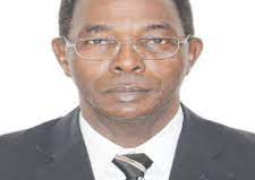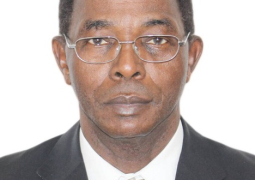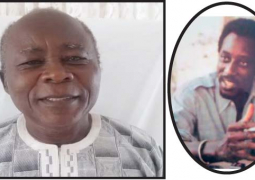
June 26, 2025
Publicity or Policy Action
The attentive segment of the public had a fleeting view of the state of the foreign service of The Gambia when the late Vice President, Badara Joof, shortly after his appointment in 2022, publicly raised the question as to whether The Gambia had a discernable foreign policy. That public statement made some observers wonder why a serving vice president would publicly decry the perceived shortcomings of the country’s external sector rather than deal with the problem internally with his principal and colleagues as an important matter of national policy. In the event they discovered that the portfolio holder was incapable of playing a lead role in crafting a policy (assuming there was none, as tangentially signaled by the late VP), then they would have been justified to use their authority to seat a replacement. It would appear that the current foreign minister, Dr. Tangara, who has recently complained in public about the difficulties with political appointees at diplomatic stations abroad, has manifested a similar situation. One would expect that as the minister with the responsibility to ensure the efficient functioning of his portfolio, including effective risk management and compliance enforcement, is on terra firma to swiftly and rigorously deal with difficulties as they arise, rather than to literally air his portfolio’s dirty linen in public. In this case, the minister has the option of addressing the issues with his principal or putting up a cabinet paper for appropriate reforms. Ordinarily in a mature democratic system, if a cabinet minister cannot have his way to legitimately deal with problems within his ministry, he has the choice to resign, rather than to complain sporadically.
‘Stumbling Blocks’
Recent news reports concerning difficulties with political appointments in the Gambia’s Foreign Service are both educative and disturbing in equal measure. The information that has emerged about the low level of match between the temperament and behavior of some political appointees in the Gambia’s diplomatic missions and the established standards of diplomatic practice expected of all foreign service employees, was indeed informative to many Gambians. In his remarks made at a public forum or “Mansa Kunda” dialogue recently the foreign minister while confirming that he had nothing against political appointments to diplomatic positions in the foreign service, he however expressed concern about some political appointees as ‘stumbling blocks’, essentially embarrassing encumbrances, because of their behavior in the diplomatic missions. The events that followed this revelation constituted the disturbing aspects of this story. Those events included an obstreperous and stinging rebuke of the minister by the current Gambian ambassador in Turkey, Mr. Alkali Conteh. I have no knowledge of Mr. Conteh’s background or experience, but he was right to say that every political appointee comes with some experience unique to his or her past. Furthermore, the ambassador’s comments appeared to reflect some sense of lingering frustration about the management of the Foreign Service. That notwithstanding, many observers have viewed the ambassador’s rebuke of his minister as denotative of either an isolated episode of fatuous insubordination or indeed a serious case of contumacious conduct due, perhaps, to a lack of sufficient immersion in conventional public service norms and the ground rules and precepts of statecraft. In any event, this matter reflects, ipso facto, some broad underlying governing difficulties in the Foreign Service.
According to local media sources, the foreign minister in his remarks at the public forum noted above stated: “I am not against political appointments at diplomatic missions, but unfortunately, some of them go there and think they are entitled and become stumbling blocks at our embassies.” As examples of the embarrassing situations created by political appointees in diplomatic missions, the minister reportedly cited a number of incidents unbecoming of diplomats, such as physical altercation between an ambassador and a protocol officer, and a case involving the removal of a Gambian diplomat from a conference table because he did not dress up properly for the occasion. The minister also indicated that one of the cases of misconduct by a Gambian diplomat “was mentioned as a case study in a diplomatic school in Malta, in the presence of a Gambian student who felt deeply humiliated,” The first initial reaction to the minister’s public remarks about political appointments in the diplomatic service came from Lamin Jawara, a senior official of the governing National People’s Party. Mr. Jawara’s remarks were generally issue-focused and fairly well contained. In essence, he rightly emphasized among other things, the responsibility of the Foreign Ministry in not only preparing new recruits for overseas assignments regardless of their mode of appointment, but also to support and monitor their performance once they are fully engaged. (The Standard, May 23, 2025). The stinging open letter from ambassador Conteh addressed to the minister placed the senior diplomat at the eye of the storm that put a spotlight on the internal problems of the foreign ministry. Without going into the details of the ambassador’s widely publicized comments, suffice it to note that he challenged all the key arguments of the minister regarding political appointments and chastised him for his ineffective leadership of the Ministry of Foreign Affairs. For instance, he described the minister’s account about some of the embarrassing cases noted above as “a smear campaign” against political appointees in the diplomatic service, as there are other political appointees in other sectors of government. He finally concluded by stating that: “the problem within The Gambia Foreign Service has nothing to do with the political appointees, but everything to do with your abdication of responsibility, pure and simple!”
Mr. Conter’s open letter was widely criticized and some critics called for his withdrawal from the Foreign Service. According to one article which appeared in Africa Press dated June, 4th 2025(based on original Standard newspaper reports), and titled , “Ambassadors Vs Foreign Minister”, focused on the institutional aspect of the controversy arguing that the problems in the Gambia’s diplomatic service reflects the general neglect of “professional and career pathways” in the recruitment of mission staff. The article further stated the following: “The recent actions of individuals like Alkali Conteh, whose insubordination raises questions about authority and professionalism, serve as a stark reminder of the deterioration of values that once guided our nation’s foreign relations.”
Regardless of one’s position on this matter, the implications of the controversy are significant. Some of these implications, which were alluded to above, will be further highlighted in the following paragraphs.
The Conundrum of Political Appointments
In his letter, Ambassador Conteh seemed to suggest that the foreign minister unjustifiably singled out political appointees in the Foreign Service in his remarks, as there are other categories of political appointments made by the President including cabinet ministers, permanent secretaries and heads of state-owned enterprises. Political appointments are common occurrences in many countries. In the USA, for example, political appointees enter the federal service based largely on their political connections with and support for the policies and objectives of the incoming administration. In theory, there is nothing wrong with this practice, provided that the persons involved are sufficiently qualified for their assignments. In the case of political appointments in the diplomatic service the individuals involved, apart from their professional qualifications and experiences should also have sound knowledge of their own country as well as a thorough understanding of their host country or organization, its history and current events, to be effective.
In the Gambia, not all appointments made by the President are the same, contrary to the assumption in Ambassador Conteh’s letter. The appointment of ministers, permanent secretaries and ambassadors by the president are statutory, or constitutional provisions to ensure that the central machinery of government functions as it should and for that reason, qualified and competent persons are appointed to these positions. Before 1994 when the military entered politics, the majority of ministerial appointments were made from among the elected members of parliament (the House of Representatives). In this way, a minister assumed his office with significant ‘original legitimacy’ as a duly elected representative of his constituents in parliament. In the area of foreign service under Sir Dawda’s administration, highly experienced and qualified Gambians were appointed as heads of the country’s diplomatic missions. For example, among these were Bocar Ousman (BO) Semega-Janneh, a former civil servant in the Department of Surveys for more than a decade and Mayor of Bathurst for nearly a decade, Samuel Jonathan Okikiola Sarr, a former chief executive of Nigeria Airways in The Gambia, Dr. Omar Jah, a former university professor and distinguished scholar in Islamic Though and Civilization. Others included former permanent secretaries Ousman Sallah and Dr. Lamine Mbye, former banking executive and former cooperatives executive, BB Dabo and Abdoulie Bojang respectively, former Governor of the Central Bank, H.R. Monday, former Chief of Protocol, Momodou Bobb and former Army Commander , Ndow Njie, to name a few. Qualified and largely career public servants were appointed to provide effective professional support to mission heads.
Immediately upon the coalition government coming into office in 2017, fresh appointments to positions in the diplomatic service had to be made following the dismantling of the former administration. Some of these appointments included qualified and experienced former public servants such as former permanent secretaries of key ministries, but a significant number of the newly recruited diplomats comprised the supporters of President Barrow’s erstwhile political party, the United Democratic Party (UDP), whose leader was the first foreign minister of the coalition government, and who had a virtually free hand in foreign affairs during his brief tenure. Following the president’s breakup with the UDP and the formation of his own party, the National People’s Party (NPP), a large number if not all previous political appointees in the foreign service were withdrawn and quickly replaced by a new cohort of political appointees with ties to the NPP.
Non-statutory political appointments involving some personnel in the foreign service reflect recognition of or rewards for their political support or expectation of their usefulness as future political assets. For some of these appointees, regardless of their ranks, the perception of accountability is confined to the expectations of the appointing authority, unlike career public servants who are accountable to the law, merit principles and the public interest. Because of their status as permanent employees of the state senior public servants are supported by strong removal protection rules while for political appointees such protections are sometimes limited largely to the pleasure of the appointing authority, as is the case in many countries. At the same time, some political appointees because of their reliance on political capital or influence may at times be under the illusion of permissiveness and invulnerability, which is one sure way to the breakdown of discipline in governance.
Given the inherent intricacies involved in some forms of political appointments, it may be understandable why the foreign minister is apparently keen to find a solution to the problems of the ‘stumbling blocks’ rolling in some of the diplomatic missions. He has mentioned that his ministry does not directly recruit personnel and that the Personnel Management Office normally carries out staff postings including those for political appointments. It is not clear whether the appointing authority, the Presidency, usually consults his ministry on the selection of candidates for political appointments. Whatever the case may be the minister in the broader scheme of things, remains the key player in finding a solution to the problems his ministry faces concerning the effective exercise of disciplinary control over all active foreign service personnel, regardless of their mode of recruitment.
Obliquity about Reputational Damage
In July 2023, four Gambian diplomats were expelled from the Gambia Embassy in Washington, DC for alleged activities or behavior incompatible with their status as diplomats in the United States. At a press conference convened in his Ministry a couple of weeks after the expulsion order, the foreign minister spoke to journalists about the case. According to the Standard newspaper of July 25 and the Point newspaper of July 27 2023, the minister stated that as far as he was aware, “there (was) nothing serious” about the incident. He further assured the journalists that the incident did not create “any reputational damage. We have not been declared persona-non-grata.”
It is not clear what the minister meant by “We have not been declared persona-non-grata.” Did the reference to ‘we’ mean the entire mission in Washington, or the four diplomats suspected of engaging in activities incompatible with their status? Such a clarification would have been useful because theoretically and historically a declaration of persona non-grata (PNG) on all mission staff of a sending state would mean the severance of diplomatic ties with that state, which was of course not the issue in this case.
Nonetheless, it is somewhat intriguing that the minister who espouses high standards of diplomatic practice would consider a case involving suspected infringement of the municipal laws of a host country by staff members of a diplomatic mission as “nothing very serious”. Furthermore, to state that this case did not rise to a level to cause reputational damage, and that “We have not been declared persona-non-grata”, is misleading at best. Persona non-grata, (PNG), as a Latin phrase simply means “person not welcome.” By standard dictionary definition and as stipulated under Article 9 of the Vienna Convention on Diplomatic Relations, PNG refers to a person who is unacceptable or unwelcome. By this definition, any diplomat who has been expelled from a host country was unwelcome or unacceptable for reasons deemed to be harmful to the host concerned. Whenever a diplomatic misconduct occurs, the procedure that is normally followed involves an initial assessment of the alleged misconduct by the intelligence and law enforcement agencies of the host or receiving country. Upon the findings of the investigation, if a declaration of PNG is warranted the foreign ministry of the host or receiving state writes a diplomatic note to officially inform the sending state about the decision they have taken. It is most likely that this procedure was followed in the case of the Washington mission scandal. At least in the case of one of the diplomats who was accused of beating his daughter with a ‘mop’, there is evidence to confirm that the police department of Montgomery County in Maryland was involved in the investigation of the case. Of course, the scale and severity of misconduct could vary relating to any one of the three broad categories under which diplomatic offences or disputes could occur, namely: national security concerns, political tensions between countries (such as sovereignty or territorial disputes) and the violations of host country laws. The case of the expelled Gambia diplomats falls under the violation of municipal or national laws.
In the study of world politics, reputation pertains to being trustworthy or reliable, which according to classical scholars, such as Thucydides, the fifth century Athenian historian, is ‘a trait worthy of preserving at all costs.” (Indeed, these virtues have always been treasured in traditional Gambian society). In contemporary international politics, reputation is gleaned from various sources including the behavior and statements of diplomatic actors. Therefore, any form of misconduct by a diplomat contributes to how his home government is viewed by others. The minister mentioned an adverse event involving a Gambian diplomat as a case study in a training program on diplomacy. Clearly, such a case cannot be considered as inconsequential to the Gambia’s reputation.
The expulsion of diplomats irrespective of their ranks should never be taken lightly, because in the final analysis any request for the compulsory removal of any mission staff is suggestive of the expelling country’s discontent (‘a symbolic indication of displeasure’) and the sending country’s failure to properly select and screen its representatives before their deployment abroad. Any number of adverse events may cause reputational damage. Therefore, it would be a mistake to assume that damage to a country’s reputation is confined only to the most severe cases of misconduct or diplomatic disputes. The supposedly small infringements that may be deemed as “nothing very serious” are registered and if they are not contained, can eventually add up to paint a broad picture of the reputation and integrity of a state. In short, the expulsion of diplomats as unacceptable and unwelcome persons-‘persona non-grata’- is an indication of a receiving country’s symbolic displeasure at their misconduct.
Reform and Resuscitation
The Gambia had an outstandingly capable and well-respected foreign service before 1994. A lot has changed dramatically since then, although the service remains nominally functional. Because of recent adverse events in the foreign service, the minister made some forward-looking statements that are relevant to any serious assessment of the current situation of the service as a basis for reforms aimed at the strategic revitalization of this important sector. Speaking at the press conference after the Washington, DC embassy scandal the minister was quoted as saying that the scandal provided “an opportunity for us to do more sensitisation with our diplomats before we send them on mission”.(The point, July 27, 2023). At the mansa-kunda public forum, the minister was said to have called for structural reform of the foreign service with a recommendation to establish “a professional diplomatic corps recruited from the civil service through competitive exams. “When you have a robust and well-trained diplomatic cadre” “unethical behaviors” such as those that have occurred recently would be rare, (Gambia Journal, May 19, 2025). These reform ideas advanced by the minister are interesting. It is not clear, however, whether the minister was directing these proposals to a superior authority as an appeal for intervention; otherwise, as the steward of his portfolio, he is expected to chart the way toward meaningful reforms, rather than merely point out what ought to be done. For instance, the point about the need to ‘sensitize’ new recruits before they are deployed was made back in 2023 following the Washington mission scandal, but it is not clear how much induction training and sensitization has been carried out, and with what outcomes, since then.
I believe that the minister as the experienced chief diplomat of the country knows that the onus is on him to move beyond public pronouncements (including, seemingly, reflexive recommendations) on what ought to be done to concrete actions. Perhaps such actions have commenced, but the public is yet to see a definitive pathway to the reform and resuscitation of The Gambia’s foreign service, based on the understanding that as a small, resource-constrained developing country, The Gambia cannot afford an extensive network of diplomatic missions around the world. A strategy focused on a limited number of ruminatively considered and carefully designated ‘zones of vital interests’ amenable to reconfiguration in alignment with shifting global circumstances could be a useful guide for positioning overseas missions, managed by capable and conscientious diplomatic personnel. Maybe a strategy of this kind may suit the minister’s thinking about restructuring, because in one of his recent remarks, he was quoted as making the following rational and instructive observation: “Many countries are consolidating embassies to cut costs. We must do the same. Sovereignty is expensive, and we must be realistic about our limitations.” (The Point, May 28, 2025). Ultimately, however, the test of the effectiveness of any foreign service of a developing country must be based on clear principles and performance criteria. Crucial among these would be whether a developing country’s diplomats have the ability to go beyond their characteristic smooth talking and immaculate attiring to being instrumental agents of the state in building useful networks of development contacts and actively participating in negotiations for advancing the interests of their country.




